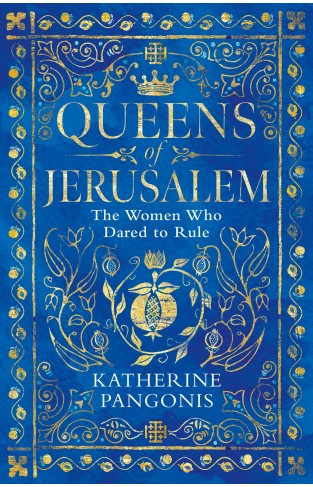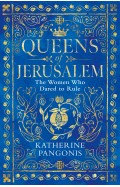Queens of Jerusalem - The Women Who Dared to Rule
By: Katherine Pangonis
-
Rs 2,630.75
- Rs 3,095.00
- 15%
You save Rs 464.25.
Due to constant currency fluctuation, prices are subject to change with or without notice.
Queens of Jerusalem - The Women Who Dared to Rule
By: Katherine Pangonis
Rs 2,630.75 Rs 3,095.00 Ex Tax :Rs 2,630.75
Queens of Jerusalem - The Women Who Dared to Rule
By: Katherine Pangonis
Rs 1,950.75 Rs 2,295.00 Ex Tax :Rs 1,950.75
Zubin Mehta: A Musical Journey (An Authorized Biography)
By: VOID - Bakhtiar K. Dadabhoy
Rs 892.50 Rs 1,050.00 Ex Tax :Rs 892.50
The Origins of Political Order From Prehuman Times to the French RevolutioN
By: Francis Fukuyama
Rs 4,045.50 Rs 4,495.00 Ex Tax :Rs 4,045.50
No similar books from this author available at the moment.
The Science of Cooking - Every Question Answered to Perfect Your Cooking
By: Dr. Stuart Farrimond
Rs 4,396.00 Rs 5,495.00 Ex Tax :Rs 4,396.00
How I Became a Dog Called Midnight: The Top-ten Magical Adventure from the Author of The Day I Fell Into a Fairytale
By: Ben Miller
Rs 2,155.50 Rs 2,395.00 Ex Tax :Rs 2,155.50
Leadership: Lessons From My Life in Rugby
By: Eddie Jones
Rs 2,335.50 Rs 2,595.00 Ex Tax :Rs 2,335.50
Puffins Brilliantly Big Bumper Joke Book: An AZ of Everything Funny!
By: John Byrne
Rs 505.75 Rs 595.00 Ex Tax :Rs 505.75
Liberation - Inspired by the Incredible True Story of World War II's Greatest Heroine Nancy Wake
By: Imogen Kealey
Rs 1,047.50 Rs 2,095.00 Ex Tax :Rs 1,047.50
Shakespeares First Folio All The Plays A Childrens Edition
By: William Shakespeare
Rs 6,745.50 Rs 7,495.00 Ex Tax :Rs 6,745.50
Heroes : The myths of the Ancient Greek heroes retold - (PB)
By: Stephen Fry
Rs 2,335.50 Rs 2,595.00 Ex Tax :Rs 2,335.50
I Want to Die but I Want to Eat Tteokbokki: the bestselling South Korean therapy memoir
By: Baek Sehee
Rs 2,245.50 Rs 2,495.00 Ex Tax :Rs 2,245.50
Attack on Titan Omnibus 5 (Vol. 13-15)
By: Hajime Isayama
Rs 4,945.50 Rs 5,495.00 Ex Tax :Rs 4,945.50
Survival of the Richest: escape fantasies of the tech billionaires
By: Douglas Rushkoff
Rs 3,990.75 Rs 4,695.00 Ex Tax :Rs 3,990.75
Gelato! - Italian Ice Creams, Sorbetti, and Granite
By: Pamela Sheldon Johns
Rs 1,058.25 Rs 1,245.00 Ex Tax :Rs 1,058.25
Churchill: A Life: The Official Biography
By: Dr Martin Gilbert
Rs 4,495.50 Rs 4,995.00 Ex Tax :Rs 4,495.50
Be Your Own Cheerleader: An Asian and South Asian Woman's Cultural, Psychological, and Spiritual Guide to Self-Promote at Work
By: Neelu Kaur
Rs 2,885.75 Rs 3,395.00 Ex Tax :Rs 2,885.75
The Art of Conscious Conversations - Transforming How We Talk, Listen, and Interact
By: Chuck Wisner
Rs 5,665.50 Rs 6,295.00 Ex Tax :Rs 5,665.50
Nahid Raza Art Is My Life By Marjorie Husain - (HB)
By: Marjorie Husain
Rs 1,700.00 Rs 2,000.00 Ex Tax :Rs 1,700.00
Garage My Little Village Junior
By: Anne Sofie Sternberg
Rs 3,685.50 Rs 4,095.00 Ex Tax :Rs 3,685.50
Princeton Review SAT Premium Prep 2023 - 9 Practice Tests + Review and Techniques + Online Tools
By: The Princeton Review
Rs 5,945.75 Rs 6,995.00 Ex Tax :Rs 5,945.75
Good Cop Bad Cop: Hero Or Criminal Mastermind? a Gripping New Thriller from the Sunday Times Bestseller
By: Simon Kernick
Rs 1,355.75 Rs 1,595.00 Ex Tax :Rs 1,355.75
EARTH COVERD CITIES THE WAY FORWARD
By: DR. BABAR HAMID CHAUHAN
Rs 800.00 Rs 2,000.00 Ex Tax :Rs 800.00
Gravity Falls Gravity Falls: Tales of the Strange and Unexplained - (Bedtime Stories Based on Your Favorite Episodes!)
By: Disney
Rs 4,045.50 Rs 4,495.00 Ex Tax :Rs 4,045.50
Star Wars How Not to Get Eaten by Ewoks and Other Galactic Survival Skills
By: Christian Blauvelt
Rs 2,120.75 Rs 2,495.00 Ex Tax :Rs 2,120.75
USMLE Step 1 Lecture Notes 2017: Pathology
By: Kaplan Medical
Rs 3,055.75 Rs 3,595.00 Ex Tax :Rs 3,055.75
The Secret Life of Clutter: Getting clear, letting go and moving on
By: Helen Sanderson
Rs 2,545.75 Rs 2,995.00 Ex Tax :Rs 2,545.75
Zubin Mehta: A Musical Journey (An Authorized Biography)
By: VOID - Bakhtiar K. Dadabhoy
Rs 892.50 Rs 1,050.00 Ex Tax :Rs 892.50
Queens of Jerusalem - The Women Who Dared to Rule
By: Katherine Pangonis
Rs 2,630.75 Rs 3,095.00 Ex Tax :Rs 2,630.75
Queens of Jerusalem - The Women Who Dared to Rule
By: Katherine Pangonis
Rs 1,950.75 Rs 2,295.00 Ex Tax :Rs 1,950.75















-120x187.jpg?q6)










-120x187.jpg?q6)


-120x187.jpg?q6)





-120x187.jpg?q6)












-120x187.jpg?q6)
































